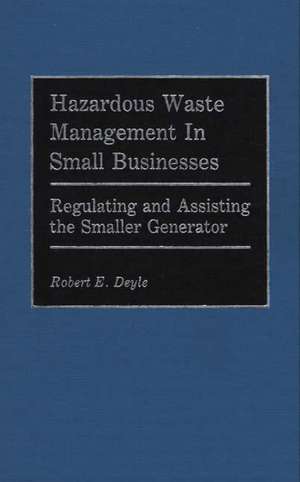Hazardous Waste Management in Small Businesses: Regulating and Assisting the Smaller Generator: Lecture Notes in Economics and
Autor Robert E. Deyleen Limba Engleză Hardback – 30 sep 1989
This book examines the public policy challenge presented by government regulation of small generators of hazardous waste. The author includes both small quantity generators, typically regulated by the federal government, and conditionally exempt small quantity generators, generally exempt from federal requirements, in his discussion. . . . While its focus is on hazardous waste regulations, this book may be of interest to all those involved in the regulation of small business. "The Hazardous Waste Consultant"
Small businesses that generate hazardous wastes present a significant public policy challenge--and one that is fundamentally different from that presented by their larger corporate counterparts at whom most regulation is aimed. This volume examines policy questions posed by the special situation of small businesses based on both recent studies of hazardous waste management and compliance behavior of smaller generators and evaluations of smaller generator assistance programs. Deyle explores such key issues as the ways in which small businesses do and do not handle their hazardous wastes, the costs involved in instigating waste management programs, the proper role of government in regulating small businesses, and the extent to which education and assistance programs can help alleviate the problem.
Deyle begins with important background information that sets the context for the discussion that follows. He goes on to assess the options available to government for influencing private-sector environmental management and presents a detailed examination of small business compliance in theory and practice. A chapter contributed by Rosemary O'Leary discusses the liability exposure of small businesses who generate hazardous wastes and the implications of liability for smaller generator waste management practices. Finally, Deyle reviews the findings of several studies on compliance and presents the results of his own case study of smaller generator compliance in New Jersey. The volume concludes with an evaluation of federal and state programs that have been undertaken to enhance hazardous waste management by smaller generators. An important contribution to the public policy literature, this book will be of significant interest to both students and practitioners in the field.
Preț: 345.49 lei
Preț vechi: 556.15 lei
-38% Nou
66.11€ • 68.89$ • 54.74£
Carte tipărită la comandă
Livrare economică 03-17 aprilie
Specificații
ISBN-10: 0899303498
Pagini: 182
Dimensiuni: 156 x 234 x 13 mm
Greutate: 0.44 kg
Ediția:New.
Editura: Quorum Books
Seria Lecture Notes in Economics and
Descriere
Small businesses that generate hazardous wastes present a significant public policy challenge--and one that is fundamentally different from that presented by their larger corporate counterparts at whom most regulation is aimed. This volume examines policy questions posed by the special situation of small businesses based on both recent studies of hazardous waste management and compliance behavior of smaller generators and evaluations of smaller generator assistance programs. Deyle explores such key issues as the ways in which small businesses do and do not handle their hazardous wastes, the costs involved in instigating waste management programs, the proper role of government in regulating small businesses, and the extent to which education and assistance programs can help alleviate the problem.
Deyle begins with important background information that sets the context for the discussion that follows. He goes on to assess the options available to government for influencing private-sector environmental management and presents a detailed examination of small business compliance in theory and practice. A chapter contributed by Rosemary O'Leary discusses the liability exposure of small businesses who generate hazardous wastes and the implications of liability for smaller generator waste management practices. Finally, Deyle reviews the findings of several studies on compliance and presents the results of his own case study of smaller generator compliance in New Jersey. The volume concludes with an evaluation of federal and state programs that have been undertaken to enhance hazardous waste management by smaller generators. An important contribution to the public policy literature, this book will be of significant interest to both students and practitioners in the field.












